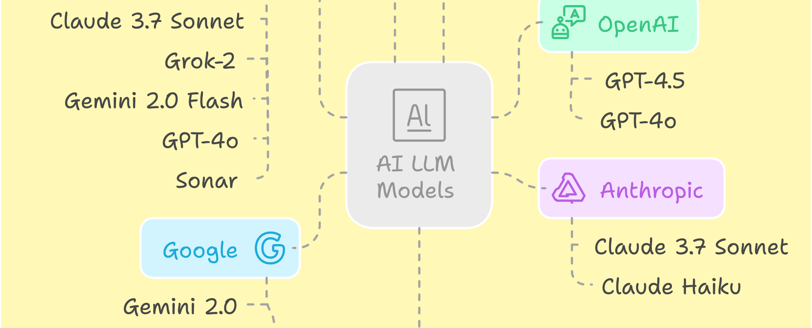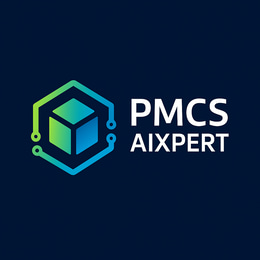

Selecting an AI Model: A Practical Overview of Current LLMs
The competitive environment among AI companies, marked by the frequent release of new features and updated versions of Large Language Models (LLMs), can create confusion for Small-to-Medium Enterprises (SMEs) seeking to identify the most appropriate AI tools for everyday business activities.
This article provides clear guidance by listing the current capabilities of various LLMs as of March 2025, helping SMEs understand their practical applications without bias or subjective assessment.
OpenAI
GPT-4.5: A general-purpose model equipped with web search functionality, deep research capabilities, and an integrated Python interpreter. It supports advanced data analysis, multimedia interactions, and offers features like DALL-E 3 for image generation, voice mode, video input, memory retention, custom instructions, and the ability to create custom GPTs.
GPT-4o: A multimodal model capable of processing text, audio, image, and video inputs. It includes real-time voice and vision processing, facilitating dynamic interactions across various media formats.
GPT-4o mini: A smaller multimodal model designed for efficient reasoning in focused tasks such as mathematics, coding, and scientific inquiries. It offers web search and deep research capabilities, with a limited Python interpreter.
o3-mini: A reasoning-focused model without web search or deep research functionalities, but includes an integrated Python interpreter. It is tailored for advanced reasoning, mathematics, coding, and scientific research tasks.
o1 series: Models designed for general-purpose tasks, complex reasoning, STEM applications, and multi-step problem-solving. They lack web search and deep research capabilities but feature an integrated Python interpreter.
Operator GPT-4.5 & 4o models: Task automation models functioning as personal AI interns to automate tasks. They include web search capabilities and an integrated Python interpreter but do not support deep research functionalities.
Anthropic
Claude 3.7 Sonnet: A general-purpose model with reasoning capabilities, lacking web search and deep research functionalities but featuring an integrated Python interpreter. It supports complex coding tasks, mathematical problem-solving, extended thinking mode, file uploads, and includes tools like Artifacts for creating web applications and diagrams. It is suitable for agentic coding tasks requiring autonomous code generation and execution.
Claude 3.5 Sonnet: A general-purpose model without web search or deep research capabilities but includes an integrated Python interpreter. It offers the Artifacts tool, file upload functionality, and is proficient in general knowledge, question-answering, and text summarisation.
Claude Haiku: A multimodal model optimised for speed and real-time responses. It lacks web search and deep research capabilities but includes an integrated Python interpreter.
Gemini 2.0 Pro: A reasoning-focused model with web search and deep research capabilities, along with an integrated Python interpreter. It supports advanced reasoning, complex problem-solving, and accepts text, audio, and image inputs, demonstrating strong coding performance.
Gemini 2.0 Flash: A multimodal model optimised for speed and efficiency, providing quick answers to simple queries and real-time information. It includes web search and deep research capabilities, along with an integrated Python interpreter.
Gemini Deep Research: A reasoning and research assistant model with web search and deep research functionalities but without an integrated Python interpreter. It is designed for in-depth research, specialised knowledge, and complex analysis.
Notebook LM: A research assistant model without web search, deep research capabilities, or an integrated Python interpreter. It analyses user documents for quick insights and content generation, including podcast generation from uploaded sources.
xAI
Grok 3: A reasoning-focused model with web search and deep research capabilities, along with an integrated Python interpreter. It features advanced reasoning with "Think" mode, "Big Brain" mode, deep search, advanced voice integration, and multimodal processing.
Grok 2: A general-purpose model with C4 capabilities, including web search and deep research functionalities but without an integrated Python interpreter. It supports text and vision understanding and provides real-time information access from the X platform.
Meta
Llama 3.3 70B: A reasoning-focused model with web search capabilities and limited deep research functionality, lacking an integrated Python interpreter. It supports complex reasoning, multi-step problem-solving, and advanced language understanding. It is open-source with certain restrictions.
DeepSeek
DeepSeek R1: A reasoning-focused model without web search or deep research capabilities but includes an integrated Python interpreter. It is tailored for complex coding challenges, mathematical computations, and scientific explanations. It is open-source.
DeepSeek V3: A general-purpose model with reasoning capabilities, lacking web search and deep research functionalities but featuring an integrated Python interpreter. It supports content generation, writing, general question answering, and multimodal capabilities. It is open-source.
Perplexity AI
Perplexity AI: A search engine model with web search and deep research capabilities but without an integrated Python interpreter. It provides responses with citations and integrates multiple leading LLMs, including Claude 3.7 Sonnet, Grok-2, Gemini 2.0 Flash, GPT-4o, and Sonar (Perplexity's own model built on Llama 3.3).
This overview aims to assist SMEs in understanding the various LLMs available, their types, capabilities, and additional features. By providing this information, SMEs can make informed decisions when selecting an AI model that aligns with their specific business needs and operational goals.
The Role of PMCS AIxpert
Whether you are a micro-business exploring AI for the first time or a medium-sized enterprise scaling innovation, PMCS AIxpert offers tailored solutions to help SMEs navigate their AI journey:
Identifying AI opportunities specific to your industry.
Ensuring compliance with UK and EU AI regulations.
Embedding ethical and sustainable AI practices into operations.
By providing industry-specific tools, regulatory guidance, and hands-on support, PMCS AIxpert empowers SMEs to unlock the transformative potential of AI.
Reach Out to Us:
Email: info@pmcs-aixpert.com
Website: www.pmcs-aixpert.com
Together, let’s shape a future where SMEs drive the UK’s success as an AI powerhouse.
